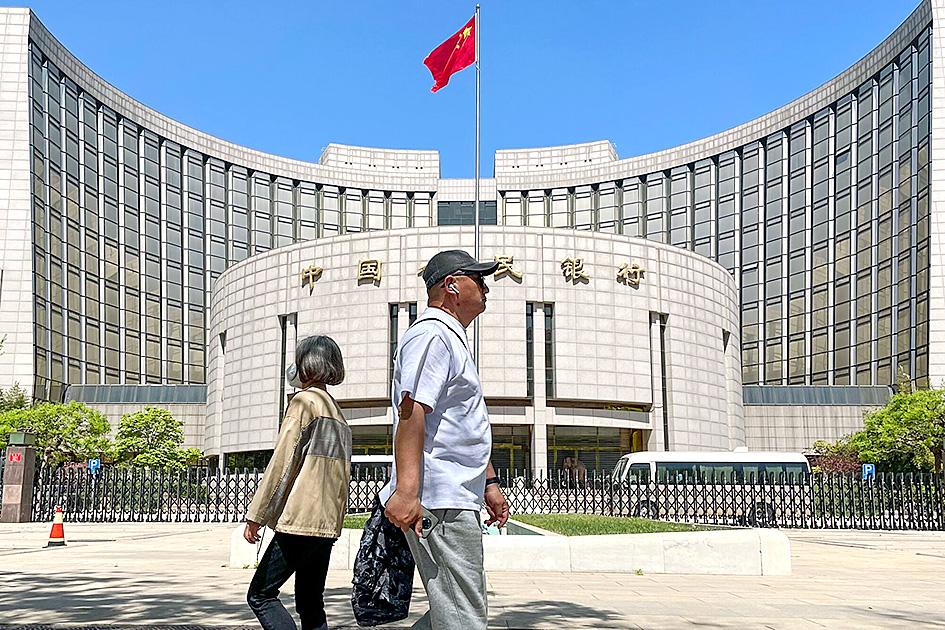Taiwanese companies are cutting their exposure to China just as they ramp up investment in other parts of the world in the latest sign of how growing tensions between the US and China are reshaping global supply chains.
New investments in China by Taiwanese companies declined 10.4 percent year-on-year in the first quarter of the year to US$758 million, data released by the Investment Commission yesterday showed.
That follows an almost 14 percent decrease in such investment last year.

Photo: Bloomberg
Taiwanese companies, traditionally among the biggest investors in China, have been reducing new capital expenditure in the world’s second-largest economy over the past decade. The slowdown has accelerated since former US president Donald Trump began pushing US companies to decouple from China, a policy largely continued by the administration of US President Joe Biden.
In addition to the slowdown in new money, Taiwanese firms pulled a record amount of profit out of China last year, Chinese-language media reported.
Taiwanese-listed companies repatriated NT$114 billion (US$3.72 billion) of investment income from China last year, the Financial Supervisory Commission said in a statement on Tuesday.
The paring back of cross-strait investment comes as China has ratcheted up the political, military and economic pressure on Taiwan since the 2016 election of President Tsai Ing-wen (蔡英文).
China responded to Tsai’s stopover in California early this month — during which she met with US House of Representatives Speaker Kevin McCarthy — with military drills around Taiwan.
Beijing officials have been keen to reverse the trend of Taiwanese firms exiting China.
Wang Huning (王滬寧), the No. 4 official in the Chinese Communist Party, promised greater efforts to persuade Taiwanese businesses to invest in China and to help them integrate into the Chinese economy.
Slowing investment in China stands in contrast to a rapid increase in Taiwanese investment elsewhere.
Total Taiwanese overseas investment, excluding China, surged 240 percent to US$6.9 billion in the first quarter, the Investment Commission data showed, with half of that due to a US$3.5 billion investment by Taiwan Semiconductor Manufacturing Co (台積電) in a plant in Arizona.
Investment in Southeast Asia also almost doubled as companies seek alternative production bases outside China.

DAREDEVIL: Honnold said it had always been a dream of his to climb Taipei 101, while a Netflix producer said the skyscraper was ‘a real icon of this country’ US climber Alex Honnold yesterday took on Taiwan’s tallest building, becoming the first person to scale Taipei 101 without a rope, harness or safety net. Hundreds of spectators gathered at the base of the 101-story skyscraper to watch Honnold, 40, embark on his daredevil feat, which was also broadcast live on Netflix. Dressed in a red T-shirt and yellow custom-made climbing shoes, Honnold swiftly moved up the southeast face of the glass and steel building. At one point, he stepped onto a platform midway up to wave down at fans and onlookers who were taking photos. People watching from inside

A Vietnamese migrant worker yesterday won NT$12 million (US$379,627) on a Lunar New Year scratch card in Kaohsiung as part of Taiwan Lottery Co’s (台灣彩券) “NT$12 Million Grand Fortune” (1200萬大吉利) game. The man was the first top-prize winner of the new game launched on Jan. 6 to mark the Lunar New Year. Three Vietnamese migrant workers visited a Taiwan Lottery shop on Xinyue Street in Kaohsiung’s Gangshan District (崗山), a store representative said. The player bought multiple tickets and, after winning nothing, held the final lottery ticket in one hand and rubbed the store’s statue of the Maitreya Buddha’s belly with the other,

‘NATO-PLUS’: ‘Our strategic partners in the Indo-Pacific are facing increasing aggression by the Chinese Communist Party,’ US Representative Rob Wittman said The US House of Representatives on Monday released its version of the Consolidated Appropriations Act, which includes US$1.15 billion to support security cooperation with Taiwan. The omnibus act, covering US$1.2 trillion of spending, allocates US$1 billion for the Taiwan Security Cooperation Initiative, as well as US$150 million for the replacement of defense articles and reimbursement of defense services provided to Taiwan. The fund allocations were based on the US National Defense Authorization Act for fiscal 2026 that was passed by the US Congress last month and authorized up to US$1 billion to the US Defense Security Cooperation Agency in support of the

HIGH-TECH DEAL: Chipmakers that expand in the US would be able to import up to 2.5 times their new capacity with no extra tariffs during an approved construction period Taiwan aims to build a “democratic” high-tech supply chain with the US and form a strategic artificial intelligence (AI) partnership under the new tariffs deal it sealed with Washington last week, Taipei’s top negotiator in the talks said yesterday. US President Donald Trump has pushed Taiwan, a major producer of semiconductors which runs a large trade surplus with the US, to invest more in the US, specifically in chips that power AI. Under the terms of the long-negotiated deal, chipmakers such as Taiwan Semiconductor Manufacturing Co (TSMC, 台積電) that expand US production would incur a lower tariff on semiconductors or related manufacturing